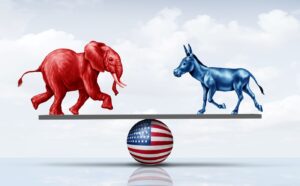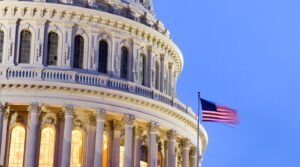Social conservatives and economic conservatives are getting along better than they have in years. And it’s not just at the tactical level—two factions setting aside their differences to fight a common foe who threatens both. To the contrary, prominent conservative writers as diverse as Arthur Brooks, Wilfred McClay and Peggy Noonan are articulating a new fusionism that sees economic and cultural issues as tightly integrated. Economic and social conservatives are starting to embrace each other’s issues like they haven’t in more than a generation.
Still, there are frictions. And nothing reveals them like hearing people talk about the Tea Party.
Does the Tea Party prove that economic issues are now more important than social issues, both in American politics generally and on the right in particular? Should social conservatives make peace with the fact that their issues are not the hot issues in this election? Do we need to accept that voters outside the social conservative base don’t want to hear about God, marriage and abortion, especially at a moment when government is nationalizing huge chunks of the economy, destroying basic liberties in the name of centralized economic planning, and hocking our grandchildren’s futures in order to jack up present consumption?
Or is the Tea Party really good news for social conservatives? Does it represent not only a reaction against the injustices of socialist policy, but against the secularization and de-moralization of American politics? Is the Tea Party protesting not only a government takeover of the economy, but the denial of the intrinsic sacredness of the human person and the “natural” or pre-political qualities of human relationships? Does the Tea Party prove that God, marriage and abortion are still centrally relevant to American politics, and that there’s more hope than ever for the future of social conservatism?
I answer “yes” to all of the above.
Start your day with Public Discourse
Sign up and get our daily essays sent straight to your inbox.Let’s approach the whole issue from another angle. What explains the success of the Tea Party? At first glance it would appear that all the really smart critiques of social conservative movements—such as those of Maggie Gallagher, James Davison Hunter, and now Michael Gerson and Pete Wehner—also apply pretty well to the Tea Party. And the excessive populism of the Tea Party, which not only opposes elitism but often resents elites as such, is a major hindrance to the emergence of wise leadership in the movement. Yet the Tea Party has been able (at least so far) to have a larger impact on American politics, and with much less investment of time and resources, than social conservative movements centered on life and marriage. Why?
Fusionism, Old and New
Everyone would agree that the Tea Party’s primary impetus and motivation is economic conservatism; nobody thinks the Tea Party is primarily a socially conservative movement. After that, the consensus breaks down. Some see deep tensions between the “God-talking” elements of the Tea Party and more secular, socially liberal elements. Others think this narrative is overblown, and see the Tea Party as predominantly religious and socially conservative.
Jeffrey Bell and Jay Richards have recently argued that something complicated is going on. They marshal evidence that the underlying relationship between economic conservatism and social conservatism is changing. I think they’re right, and I think the Tea Party represents this on the popular level in the same way the new fusionism emerging among conservative intellectuals represents it on the elite level. And I have a theory about why this is happening, and what we can learn from it.
I expect social conservatives would generally agree that what’s most fundamentally wrong with our society is its abandonment of what might loosely be called a metaphysical view of the world. We have no sense that human life is shaped by structures of purpose, meaning and obligation that are independent of our own choices. This is the fundamental dividing line in debates over abortion, marriage, pornography, and all the other social issues. When you boil it down, the only battle that ultimately counts is between those who think you can decide the meaning of your own life, and those who think that the meaning of your life is not something you get to make up for yourself.
For most of the 20th century, economic conservatives were predominantly on the wrong side of that divide. There were some fusionist figures, of course. But the truly leading intellectuals of economic conservatism were anti-metaphysical. Von Mises and Friedman were militantly so. Hayek was a much more problematic figure; he had a foot in both camps. And the fusionists drew a good deal of their economic thinking (though very far from all of it) from the decidedly non-fusionist Von Mises, Friedman, and Hayek. So on the right, the center of gravity on economic issues was decidedly on the anti-metaphysical side of the divide.
I say all this with the deepest respect and admiration for these men. We’re talking about people who helped to deliver almost half the world from slavery. I was honored to work for Friedman during the last few years of his life. Yet the metaphysical failure is there, and it is serious. Friedman had a shallow anthropology rooted in what can only be called a vulgar utilitarianism. And this wasn’t a casual thing for him. He had thought about it carefully, and this was what he believed.
The loss of metaphysics on the economic right in the 20th century was a historical tragedy. All the structures of America’s traditional economic system—call it what you want, capitalism, free enterprise, free markets, entrepreneurship, the commercial society, whatever—were originally the product of profoundly metaphysical thinking. Most of the important intellectual victories were won in the Middle Ages, although it took until about the 17th century for all the right ideas to be combined in the right ways to assemble what we know today as the free enterprise society.
The fundamental idea that originally lay behind all our economic institutions is the intrinsic sacredness of the human person. Our economic system is as much rooted in the Declaration of Independence’s “self-evident truths” about the sanctity of human life as our laws against murder. That’s where we get the moral basis for laws protecting property rights, free exchange, and so forth from arbitrary interference.
Most importantly, that’s where we get the idea that economic activity—the confluence of human work and social systems governing resource transactions—doesn’t just move things around. It creates new wealth. The free enterprise society is, at heart, a society that understands this and deliberately encourages it. And the historical origin of that idea lies in Christian theology, with its doctrine of a God whose work creates things from nothing, and of human beings who bear that God’s image.
The Metaphysics of Property
At the end of his book Ideas Have Consequences, Richard Weaver contends that the idea of property rights is our strongest remaining link to metaphysics in the modern world. Weaver is an unappealing figure—all else aside, I’d hate to live in a society governed by his agrarian economic thinking. But on this point, he’s basically right.
Property is the most promising basis for leading people back to a larger and deeper metaphysical view of the universe. As a sociologist might put it, property provides the most promising available foundation for a “plausibility structure” for metaphysics—a framework of beliefs and assumptions that makes the metaphysical proposition credible.
The assertion “this is mine” really commits you to the whole metaphysical project. After all, what is it about “this” that makes it “yours”? Writing your name on it doesn’t make it yours. Possessing it doesn’t make it yours. Using it doesn’t make it yours. You can swipe my things, write your name on them, possess them and use them, and none of that makes them yours.
There has always been a small contingent of intellectuals, from Thrasymachus to Hobbes to Cass Sunstein, who insist that property is merely a legal or political convention—nothing is really “mine” until government says it is. Because there is no ownership other than what the government dictates, government can (in principle) take away your ownership of everything you have, for any reason, and not be violating your ownership of it. This is the ultimate reductionist position, the economic face of atheistic materialism.
The 20th-century economic conservatives did better than that, but not well enough. They argued against state control of property beyond a necessary minimum, but they did so on the basis of what was, ultimately, a set of utilitarian considerations. They argued we should respect what are traditionally called “ownership” and property “rights” because doing so makes everyone better off. On this view, property is not a political or legal convention, but it is still a social convention. “Rights” to property are civil, not natural rights.
Over against this, the human race at large, and almost all of its best intellectuals, have insisted that property is neither an arbitrary creation of the state, nor in any larger sense a useful human convention. The reality of property ownership is “just there,” whether or not we acknowledge it or find it useful. It is given in the human situation before we do anything and regardless of whatever we may think, say, or do about it.
So in the popular and traditional understanding, the statement “this is mine” commits me to believe in the existence of a whole invisible universe. Behind each visible object is an invisible reality that designates its ownership, and all these invisible realities are related to one another in a dense, intricate network of relationships. This invisible universe stands behind the visible universe and dictates its proper organization. It follows that we cannot simply rearrange the visible universe any way we like; there is a higher structure of meaning, purpose, and obligation to which our management of the visible universe must conform.
Most modern Americans are profoundly uncomfortable when confronted with metaphysical claims. But few of them feel uncomfortable looking at the house on which they’ve labored to pay the mortgage, the food they’ve labored to put on their children’s table, and the bank account they’ve labored to build up so they can pay the family’s medical bills and make charitable donations, and thinking: It’s not right for the government to just arbitrarily take this away from me. If they were taking it for a legitimate reason, like if there had been a national catastrophe, that would be one thing. But I can’t let them take it away just to reward irresponsible behavior and feather their cronies’ nests.
Far from being selfish, that is a profoundly pious thought. People do, of course, have selfish desires. But they also have desires that are not selfish. And the desire to fight back against a capricious redistribution of wealth that is transparently motivated by envy and cronyism is not a selfish desire. It is a manifestation of our invisible, intrinsic human dignity.
This, I venture to suggest, is the secret to the Tea Party’s success. For all its limitations, the Tea Party represents a popular re-moralizing and even re-metaphysicalizing (if I may put it that way) of economic conservatism in America. And since our culture is more comfortable talking metaphysically about ownership and work than it is talking metaphysically about life and marriage, the Tea Party is able to tap into the full social and cultural power of transcendent moral appeals in a way that social conservatives have never been able to do.
If this theory is true, what can conservatives of all types learn from it? I address that in a follow-up piece here.










